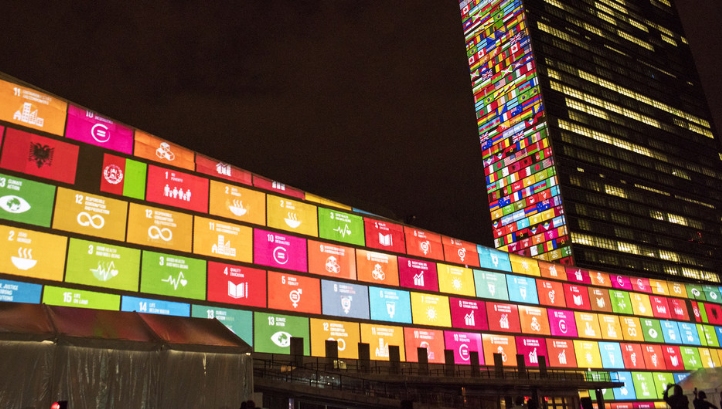More than half of institutional investors to have incorporated environmental, social and corporate governance (ESG) issues into their frameworks are using the UN’s Sustainable Development Goals (SDGs) as a guideline, a new survey has found.

The UN Global Compact has previously warned that firms which do not communicate both positive and negative contributions to all 17 Global Goals could soon lose out on investment
Conducted by BNP Paribas’ Securities Services arm, the survey quizzed 347 institutional investors from across the globe on their approach to embedding ESG into their decision-making processes and their portfolios.
It found that the overall commitment to sustainable finance was growing, with 75% of asset owners and 62% of asset managers saying that 25% or more of their investments are currently held in funds which incorporate environmental and social issues. In comparison, these proportions stood at 48% and 53% respectively in 2017.
A key driver in this uptake, the study found, was alignment to the SDGs, which 65% of respondents claimed their investment framework was based on. Most of these investors said they, or funds they had invested through, have set SDG-related revenue targets for investee companies. This finding backs up the UN Global Compact’s claim that companies which fail to track and communicate both positive and negative contributions to all 17 Global Goals could soon lose out on investment.
A further key factor in choosing ESG investing was found by the survey to be a desire to avoid risk and invest in high-performance assets. 52% of respondents said improved long-term returns were one of their top three reasons for choosing sustainable investment, with 60% claiming that they expect their ESG portfolios to outperform their other assets within five years and 90% predicting that more than 25% of their funds will be allocated towards ESG by 2021.
BNP Paribas Securities Services’ head of asset owners Florence Fontan said the findings served to evidence the fact that the SDGs are becoming a “new compass” for investors seeking to build the business case for green investment.
However, she was also quick to highlight the survey’s findings on barriers to ESG investing. Respondents ranked data challenges, costs, a lack of advanced analytical skills and greenwashing risks as their four top barriers to ESG integration, ahead of heightened risks.
“ESG investment is becoming increasingly important for investors, and our survey highlights investors’ appetite to pursue both purpose and performance,” Fontan said.
“However, practical integration has its challenges due to data and technology barriers, and deep ESG investment is still finding its feet. The next two years will be critical to achieving the right investment mix, technology and skills in place.”
Green finance boon
The United Nations estimates that $6trn of new investments are needed to reach the Global Goals, meaning that their completion will require financial support from governments, corporates, investment firms and individual investors.
The good news is that, amid concerns that the next financial crash is likely to be climate-related, BNP Paribas Securities Services’ study is just one of many having documented the growth of green investment in recent times.
The Climate Bonds Initiative (CBI), for example, found last year that the global green bonds market grew by a staggering 78% between 2016 and 2017. During the twelve-month period, national and institutional investors funnelled more than $150bn into low-carbon projects.
Since then, the likes of The European Investment Bank (EIB), ING, Verizon and The World Bank have issued major new green bonds, with the former launching a €500m (£448m) Sustainability Awareness Bond designed to boost capital market and private sector transparency for climate-related risks. It follows the World Bank’s green bond directly linking financial returns to companies performing to the standards and aims the SDGs.
Moreover, banking and insurance giants are increasingly announcing plans to make their portfolios more sustainable by divesting from coal companies and those in other sectors which are either carbon-intense or at high risk of deforestation.
Another move which suggests that the investment community is beginning to take the Paris Agreement and the SDG agenda seriously include the recent launch of a framework dubbed the Investor Agenda, which provides a blueprint for climate action across the fields of investment, corporate engagement, investor disclosure and policy advocacy. A coalition of almost 400 investors with $23trn in collective assets has pledged to support the framework.
Nonetheless, green finance still makes up a small proportion of the global finance sector and concerns about the wider industry’s lack of climate action continue to persist. The reinsurance and pension fund sectors are two key areas to have faced scrutiny in recent months, with critics claiming that they are failing to progress towards key climate goals by continuing to invest in coal projects over low-carbon alternatives.
The SDGs at edie Live 2019
The Sustainable Development Goals are taking centre stage at the UK’s largest sustainability and energy exhibition this year, with an entire Theatre and day dedicated to the topic at edie Live on 21-22 May.
The two-day show – edie’s biggest event of the year – has become a highlight of the calendar for sustainability, energy and environment professionals looking for new ideas and solutions that will help them achieve a low-carbon, resource efficient and profitable future for their business.
Register for your free edie Live 2019 pass here.
Sarah George
